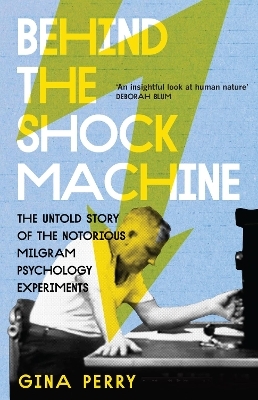
Behind the Shock Machine
the untold story of the notorious Milgram psychology experiments
Seiten
2013
|
UK edition
Scribe Publications (Verlag)
978-1-922247-09-4 (ISBN)
Scribe Publications (Verlag)
978-1-922247-09-4 (ISBN)
- Titel ist leider vergriffen;
keine Neuauflage - Artikel merken
In the thirty years he spent with Irene, Alex demonstrated an incredible ability to communicate and understand complex ideas. Yet this is much more than the story of a scientific breakthrough. Alex and Irene were emotionally connected: he missed her when she was away; he was jealous when she paid attention to others.
The true story of the most controversial psychological research of the modern era.
In the summer of 1961, a group of men and women volunteered for a memory experiment to be conducted by young, dynamic psychologist Stanley Milgram. None could have imagined that, once seated in the lab, they would be placed in front of a box known as a shock machine and asked to administer a series of electric shocks to a man they’d just met. And no one could have foreseen how the repercussions of their actions, made under pressure and duress, would reverberate throughout their lives. For what the volunteers did not know was that the man was an actor, the shocks were fake, and what was really being tested was just how far they would go.
When Milgram’s results were released, they created a worldwide sensation. He reported that people had repeatedly shocked a man they believed to be in pain, even dying, because they had been told to — he linked the finding to Nazi behaviour during the Holocaust. But some questioned Milgram’s unethical methods in fooling people. Milgram became both hero and villain, and his work seized the public imagination for more than half a century, inspiring books, plays, films, and art.
For Gina Perry, the story of the experiments never felt finished. Listening to participants’ accounts and reading Milgram’s unpublished files and notebooks, she pieced together an intriguing, sensational story: Milgram’s plans went further than anyone had imagined. This is the compelling tale of one man’s ambition and of the experiment that defined a generation.
The true story of the most controversial psychological research of the modern era.
In the summer of 1961, a group of men and women volunteered for a memory experiment to be conducted by young, dynamic psychologist Stanley Milgram. None could have imagined that, once seated in the lab, they would be placed in front of a box known as a shock machine and asked to administer a series of electric shocks to a man they’d just met. And no one could have foreseen how the repercussions of their actions, made under pressure and duress, would reverberate throughout their lives. For what the volunteers did not know was that the man was an actor, the shocks were fake, and what was really being tested was just how far they would go.
When Milgram’s results were released, they created a worldwide sensation. He reported that people had repeatedly shocked a man they believed to be in pain, even dying, because they had been told to — he linked the finding to Nazi behaviour during the Holocaust. But some questioned Milgram’s unethical methods in fooling people. Milgram became both hero and villain, and his work seized the public imagination for more than half a century, inspiring books, plays, films, and art.
For Gina Perry, the story of the experiments never felt finished. Listening to participants’ accounts and reading Milgram’s unpublished files and notebooks, she pieced together an intriguing, sensational story: Milgram’s plans went further than anyone had imagined. This is the compelling tale of one man’s ambition and of the experiment that defined a generation.
Gina Perry is an Australian writer. Her feature articles, columns, and essays have been published in The Age and The Australian, and her short fiction has been published in a number of literary magazines, including Meanjin, Westerly, and Island. Her first book, Behind the Shock Machine, was about Stanley Milgram’s obedience experiences, and her co-production of the ABC Radio National documentary on the experiments won the Silver World Medal for a history documentary in the 2009 New York Festivals radio award. In 2013 she was a finalist in the UNSW Bragg Prize for Science Writing.
| Erscheint lt. Verlag | 29.8.2013 |
|---|---|
| Sprache | englisch |
| Maße | 135 x 210 mm |
| Themenwelt | Literatur ► Biografien / Erfahrungsberichte |
| Sachbuch/Ratgeber ► Natur / Technik | |
| Geisteswissenschaften ► Psychologie ► Test in der Psychologie | |
| ISBN-10 | 1-922247-09-X / 192224709X |
| ISBN-13 | 978-1-922247-09-4 / 9781922247094 |
| Zustand | Neuware |
| Haben Sie eine Frage zum Produkt? |
Mehr entdecken
aus dem Bereich
aus dem Bereich
Buch | Softcover (2023)
Springer (Verlag)
CHF 62,95
warum es gut ist, das Leben zu hinterfragen
Buch | Hardcover (2024)
Ullstein Buchverlage
CHF 34,95


